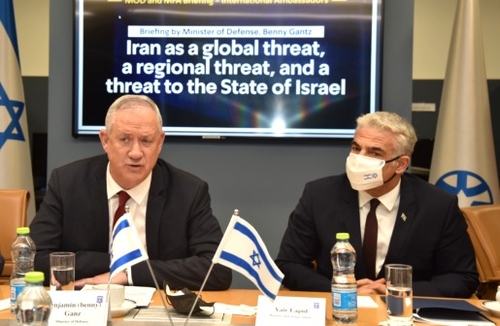Global Review: Has Putin canceled the gentleman's agreement with Netanyahu that granted Israel's air force a nearly free hand against Iranian assets in Syria?
Daniel Pipes: Rumors have spread about such a change but, so far, the Kremlin has not confirmed them. I find it hard to imagine that Moscow will challenge Israel over Syria, a secondary interest for it but a priority for Israel. The Russians will not slide into a confrontation there on behalf of Assad and Khamene'i.
GR: Is China's 25-year, $400 billion agreement with Iran for real?
 The Chinese (L) and Iranian foreign ministers elbow bumped on signing the Iran-China Strategic Cooperation Agreement on March 27, 2021. |
DP: Signing agreements with large promises and huge numbers is much easier than fulfilling them. Each side has incentive to proclaim this partnership but turning it into reality will be another matter; just note the challenges facing the $62 billion China–Pakistan Economic Corridor.
GR: Tensions are increasing between Israel and Iran: the Hamas war, Hezbollah firing rockets, Iran's new leader, Iran drone attacks against an Israeli-run ship, Iran pushing its nuclear enrichment program. In reply, Israel warns Hezbollah and Iran while pressuring the Biden administration to toughen its policies. Where do you see this going?
DP: What's called the shadow war has intensified of late. I expect it will continue for a long time, unless and until the Israelis expect an Iranian nuclear breakout to be imminent, when it will likely come out of the shadows.
GR: Israel's Defense Minister Benny Gantz stated on Aug. 4 that "Iran has violated all of the guidelines set in the JCPOA and is only around 10 weeks away from acquiring weapons-grade materials necessary for a nuclear weapon." Are we finally reaching a crisis?
 Israel's Defense Minister Benny Gantz (L) and Foreign Minister Yair Lapid addressing foreign ambassadors, Aug. 4, 2021. |
DP: This is a turning point but not one likely to provoke Israeli action; that will presumably wait until just before a nuclear breakout, defined by Simon Henderson as the moment "when a state achieves nuclear weapons capability as a fait accompli before it can be stopped by diplomatic pressure or military action."
GR: Can Israel attack Iran's nuclear installations without U.S. political and military support?
DP: A number of studies between 2007 and 2013 concluded that Israel's forces could do major damage while also concluding that they would not knock out the infrastructure as they did in Iraq in 1981 and in Syria in 2007. Much has changed since those studies but from what I can tell, the balance of power remains fundamentally the same. So yes, Israeli forces on their own can probably attack those installations.
GR: Would the U.S. administration denounce an Israeli attack (as in 1981) or stand by its ally (as in 2007)?
DP: As in 1981, I expect public outrage and private satisfaction.
GR: How would Tehran respond to an Israeli strike?
DP: Unlike the Iraqi and Syrian governments, it likely would retaliate, especially as it has an estimated 140,000 rockets and missiles at the ready in Lebanon. The only question is, would Hezbollah go along with this suicidal attack? I am not certain it would.
GR: Can Moscow and Beijing live with a nuclear Iran?
DP: Their actions suggest yes, they can. They seem to assume that a nuclear Iran is now and will always remain a problem only for Americans, not Russians and Chinese. That is a very curious assumption and doubly so when one recalls how Iran switched sides in 1979.
 Iran has switched sides before: a scene from the seizure of the U.S. embassy in Tehran, 1979-81. |
GR: Can Washington live with a nuclear Iran?
DP: Each of the past four U.S. presidents, including two Republicans and two Democrats, has said it cannot. What this means in practice has not been tested and will likely not be, given that the problem presumably can be out-sourced to the Israelis to handle.
GR: Can Biden accept a new deal under Iran's current conditions?
DP: Tehran's demands are currently unpalatable to the American government. That could change, but I doubt it.
GR: Should the Biden administration return to the Trump's policy of maximum pressure and the Abraham Accords?
DP: Emphatically, yes. Just because Democrats despise Trump does not mean they should reject all his policies. Some of them were excellent.
GR: Would a nuclear Iran distract American attention from the Asian pivot?
DP: It would, as would the other turmoil in the Middle East, including widespread anarchy, Turkish bellicosity, Palestinian irredentism, and continued jihadism.
 GR: Is Western opposition to the Iran deal, the JCPOA, growing? For example, the organization United Against Nuclear Iran includes former Senator Joe Lieberman and August Hanning, the former director of Germany's Federal Intelligence Service (BND).
GR: Is Western opposition to the Iran deal, the JCPOA, growing? For example, the organization United Against Nuclear Iran includes former Senator Joe Lieberman and August Hanning, the former director of Germany's Federal Intelligence Service (BND).
DP: Yes, there is a fairly common understanding that "it is no longer 2015," especially because of the many aggressive Iranian actions since then and because the sunset provisions are much closer.
GR: Why is the European Union, led by Germany, so soft on Iran?
DP: That softness results from a mix of the "Venus mentality" that has dominated Europe since 1945 and a focus on economic benefits. The transformation of Europeans from world conquerors and world war makers into a largely meek, apologetic, and guilt-ridden people is amazing. Lacking military power, technical creativity, and economic dynamism, Europe falls further and further away from its five centuries of global dominance.
